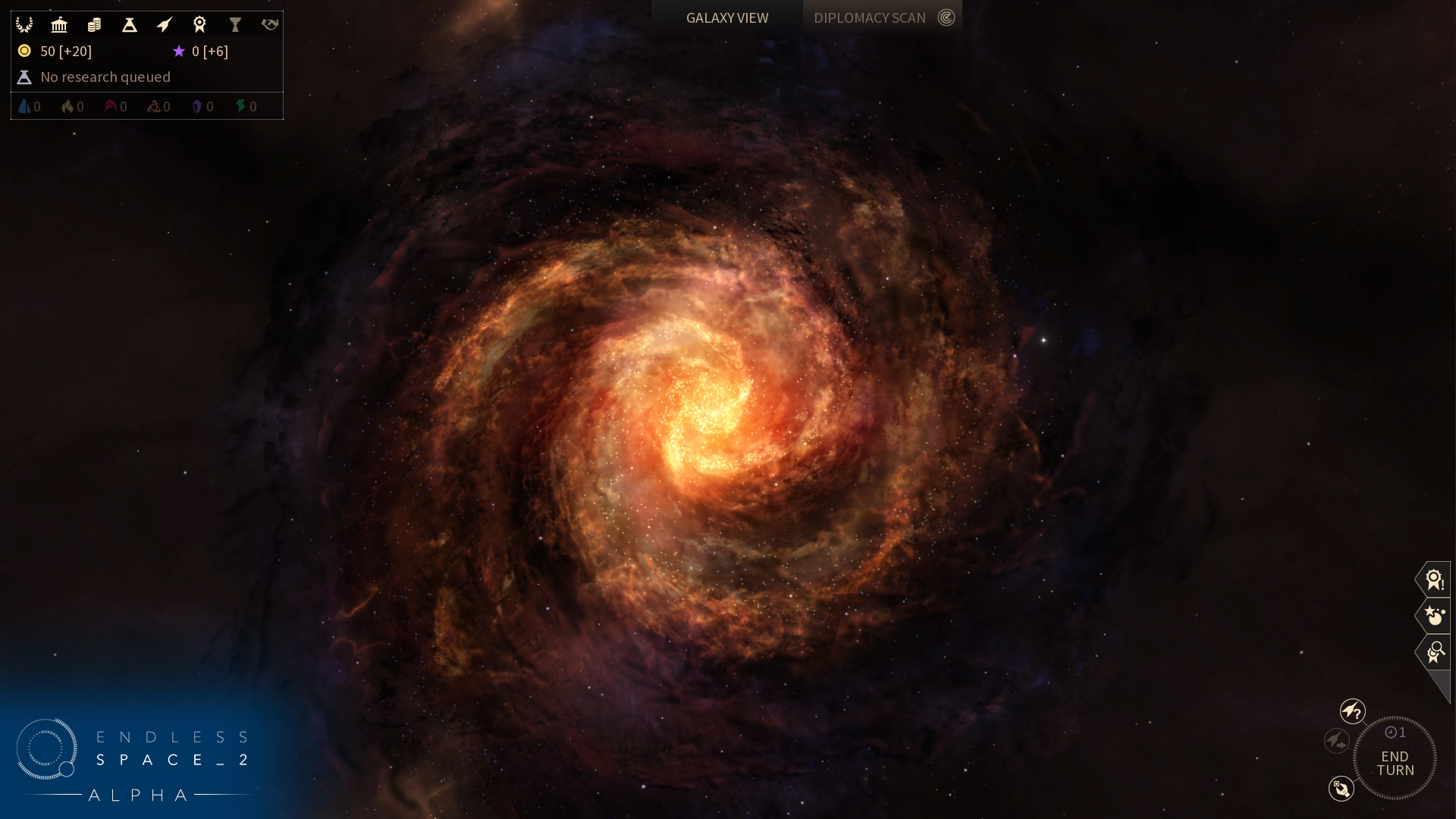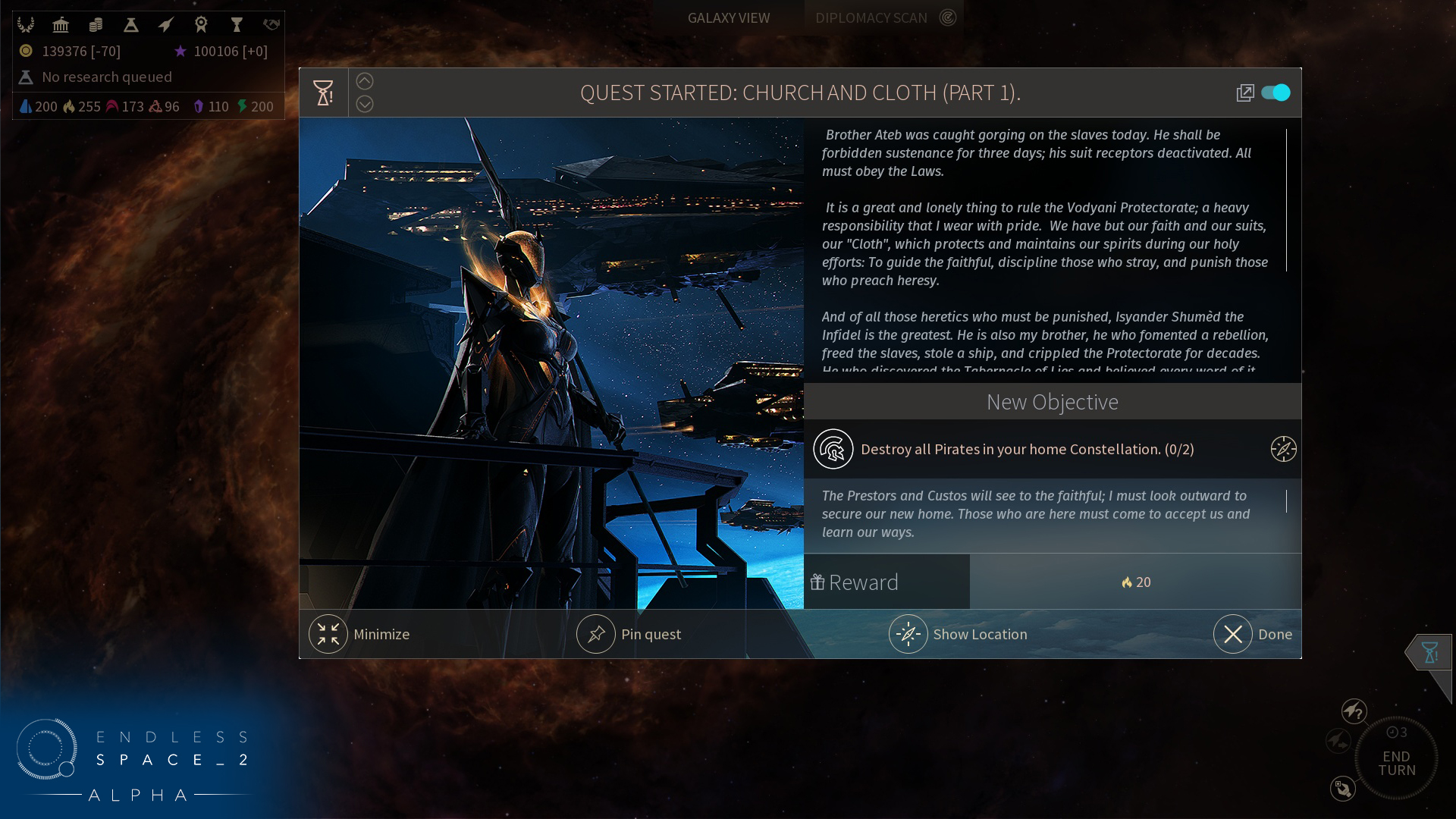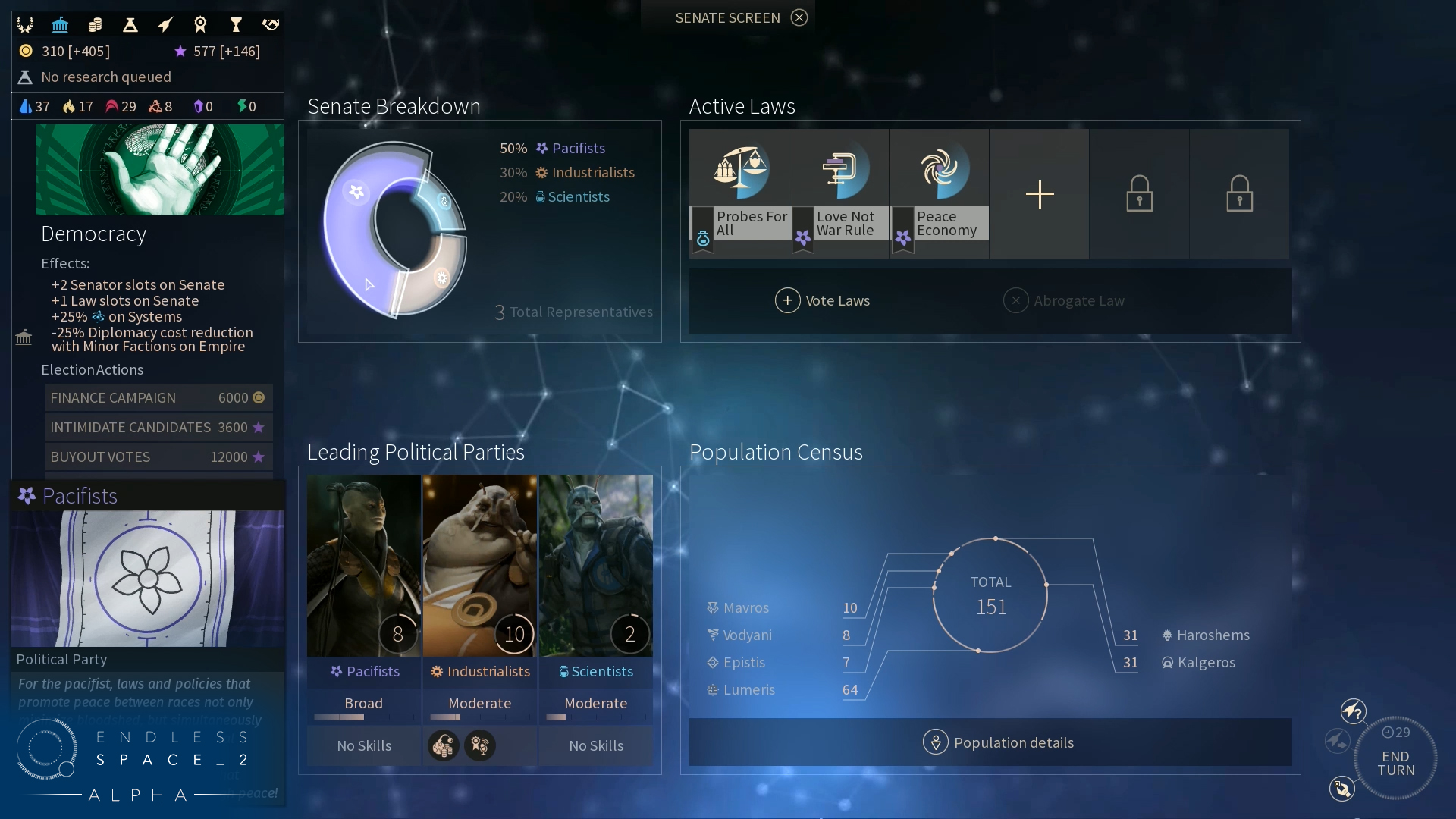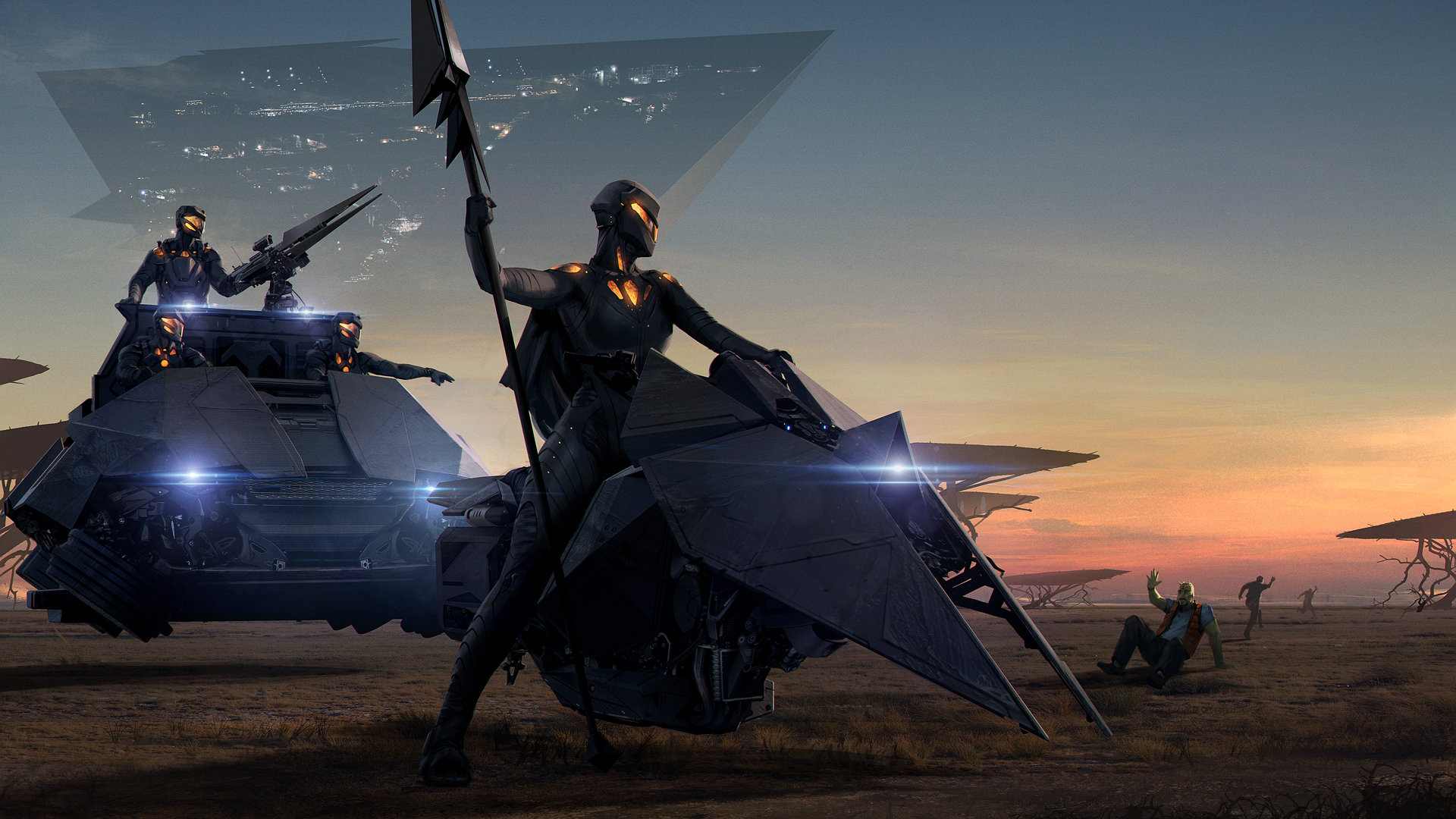Endless Space 2 takes Endless Legend's quests and varied factions to the stars
How Amplitude Studios is creating a 4X with personality, politics, and peril.
The Lumeris are Endless Space 2's trading faction. They're masters at generating Dust—nano-elements created by an ancient race, now the currency of the galaxy's more primitive inhabitants. An hour into my session with Amplitude's 4X sequel, I'm generating hundreds of Dust per turn. An aggressive minor faction sends a fleet of ships in my direction. In retaliation, I bribe them into subjugation.
If you've played Endless Legend, you'll be familiar with Amplitude's asymmetrical approach to factions. The differences go beyond units and bonuses—each has its own specific purpose, ideology and systems. For instance, the Lumeris don't send big ships filled with millions of people to colonise planets. Instead, they spend Dust to instantly construct an outpost, staking a claim to the world. From there, it's a case of growing the outpost's size until the planet is declared fully colonised. If another species starts construction of a colony ship destined for that planet, or another Lumeris faction builds a rival outpost, it's a race to see who can claim it first.
The Vodyani are the second new faction of Endless Space 2's early access release. Uplifted by the ancient and powerful Endless, they live in giant Ark ships that can leech resources from the planets they orbit. In a way, they're extreme environmentalists. Their terrestrial home was destroyed by the overexploitation of its resources, and now they're keen to prevent the same from happening elsewhere. Luckily, planets tend to have a more renewable resource that they can harness: the populations of other factions.

The Vodyani are strong, but few in number. Amplitude wants losing even one of them to be a big deal. They're on a crusade to annihilate intelligent life, but will also harvest lifeforms to increase their own population—a process that can lead to the new citizens inheriting traits from the people they've absorbed.
"We all agreed that it would be better to have an unbalanced game with crazy faction all being different, than to have a perfectly balanced game with all the factions looking alike," says Romain de Waubert de Genlis, creative director of Endless Space 2. That's not to say Amplitude /wants/ an unbalanced game, but they're using early access as a means to discover how far they can push each faction. "It's a time to experiment," says de Genlis. "It's not a time when your game should be finished."
Two returning factions from Endless Space will join the Vodyani and Lumeris to complete Endless Space 2's early access roster. The Sophons are pacifists, dedicated to science. The Cravers are machine insects, bred for war and consumption. It's a disparate bunch, destined for conflict. And, each faction will have an accompanying questline based on their culture and ultimate goals. "Each storyline you have for each faction branches out several times, and that leads to, of course, different stories, but also to different gameplay that you unlock," says de Genlis.
As in Endless Legend, Amplitude uses quests to add texture to the underlying strategy—fleshing out the world, and making each campaign different. Amplitude is pushing its quest design even further for Endless Space 2, and now have a dedicated designer working full time on creating new missions and events.
The biggest gaming news, reviews and hardware deals
Keep up to date with the most important stories and the best deals, as picked by the PC Gamer team.
"The other day we looked at the number of words, and we couldn't believe," says de Genlis, "it's closer to an RPG than a strategy game. It's pretty unbelievable." Quests can come from multiple sources: exploration, population, and galaxy wide events. Each quest could also be part of a chain—something that you won't realise until, some turns later, the next step is triggered.

Each quest decision will have underlying strategic benefits, meaning that, even if you're not playing to progress the story, there are still benefits for completing missions. Amplitude is even using its quest design to shake up the political landscape of your playthrough.
"We're working on cooperative and competitive quests," says de Genlis. "You have people banding together to obtain a common objective, or competing to reach another objective." The hope is to make alliances more fragile, but also encourage temporary ceasefires against rivals. "Maybe a friend of today could be an enemy of tomorrow, but another friend for something else," says de Genlis. "It's very interesting all these links and bonds you can create, especially when they're multi-empire quests."
Much of Endless Space 2's design is an evolution of systems from Endless Legend. "We have some strong common links with Legend, but then we add a layer of modification to take that idea to the next step," says de Genlis. "That's one of the things about our games I really like, is we're building layers of 4X and trying to inherit from the good stuff from one game to the next."
For Amplitude, developing the original Endless Space was a process of figuring out how to make a 4X game. Now, they're returning to the concept with more knowledge, experience and, crucially, distance. "At the end of Endless Space … all we had in mind was Endless Space and how to make it better," says de Genlis. "With the few years that have passed, we can look back from a distance and look at the mistakes we made and the good things we did."
The core focus of Endless Legend was the terrain. "In Legends, the planet is the hero of the game … she has a soul," says de Genlis. "We created a whole storyline around a living planet." A space 4X can't utilise terrain in the same way, but it was important for Amplitude to have a core idea that informs the a player's decision making. "The way we do it in Endless Space 2, we still want that strong focus and unique thing, and that's population," says de Genlis. "The population is the hero of the game. We always try to take population into account. Population should always be at the heart of your decisions." In most 4X games, population is simply the measure of your empire's size.

In Endless Space 2, population has a political aspect. Each population cluster has a political alignment, and these ideologies have a voice in your senate. Choosing which party to support will be an important aspect of your empire's strategy. It's possible to pass laws that can give bonuses to certain play styles – such as significantly reducing the cost of military ships – but doing so requires the support of the relevant ideology. Should you find yourself the victim of Vodyani aggression, for instance, it may be in your best interest to support the militarists and enact their laws. But doing so will upset other voices within your empire.
"I think in many ways it is what an emperor should feel," says de Genlis. "If you have no population, you're the emperor of nothing. You need to have a big population to be the biggest emperor in the universe."
In my session, I get a bit carried away with buying out minor factions. Once assimilated, you gain a minor faction's planets, ships and, most importantly, population. Pretty soon, my senate—once perfectly pacifist—is filled with different ideologies. My session isn't long enough to see the fallout from this, but it's clear that internal diplomacy is going to be a big thing. Having the right party in power at the right time could give you a great advantage. Conversely, the wrong party could be disastrous.
Diplomacy between factions will function similarly to Endless Legend, with one major new feature: pressure.
"The idea with the pressure system is how can you conquer without drawing a gun?" asks de Genlis. "How can I intimidate you into doing what I want? Whether you are an AI or a player—it should be the same." The plan is to focus on the disparity between factions of different strength. "I reach a point where my economy is strong, my army is strong, my science is strong, and you look at me like a demigod," says de Genlis. "I can come and build pressure over time until you tell me, 'OK, whatever you want to leave me in peace'. I may take a planet, maybe something else. Then the pressure goes down and we're friends again." In order to mitigate building pressure, factions will need to find friends to counteract the stronger faction.

Many of these systems won't be fully implemented in time for Endless Space 2's early access release. But there's a strong framework, and much of what's to come is reliant on the feedback Amplitude gets from the community.
"Sometimes we see the community reacting and we'll change our priorities," says de Genlis. "And we want that. We want to know what's good for them." As for what's to come, de Genlis lists some of the major milestones, including four additional factions, improved space combat, improved AI and diplomacy. There's a long way to go, but, after Endless Legend's success, I'm hopeful Amplitude has another great 4X in the making.
Endless Space 2 will launch on Steam Early Access in September.

Phil has been writing for PC Gamer for nearly a decade, starting out as a freelance writer covering everything from free games to MMOs. He eventually joined full-time as a news writer, before moving to the magazine to review immersive sims, RPGs and Hitman games. Now he leads PC Gamer's UK team, but still sometimes finds the time to write about his ongoing obsessions with Destiny 2, GTA Online and Apex Legends. When he's not levelling up battle passes, he's checking out the latest tactics game or dipping back into Guild Wars 2. He's largely responsible for the whole Tub Geralt thing, but still isn't sorry.

